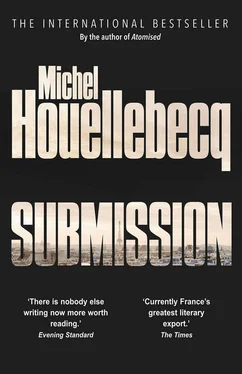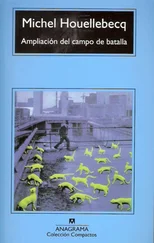Peals of laughter: the two young Arab girls were hunched over the copy of Picsou , playing ‘Spot the Difference’. Looking up from his spreadsheet, the businessman gave them a pained smile of reproach. They smiled back and went on playing, now in excited whispers. He took out his mobile again and another conversation ensued, just as long and confidential as the first. Under an Islamic regime, women — at least the ones pretty enough to attract a rich husband — were able to remain children nearly their entire lives. No sooner had they put childhood behind them than they became mothers and were plunged back into a world of childish things. Their children grew up, then they became grandmothers, and so their lives went by. There were just a few years where they bought sexy underwear, exchanging the games of the nursery for those of the bedroom — which turned out to be much the same thing. Obviously they had no autonomy, but as they say in English, fuck autonomy . I had to admit, I’d had no trouble giving up all of my professional and intellectual responsibilities, it was actually a relief, and I had no desire whatsoever to be that businessman sitting on the other side of our Pro Première compartment, whose face grew more and more ashen the longer he talked on the phone, and who was obviously in some kind of deep shit. Our train had just passed Saint-Pierre-des-Corps. At least he’d have the consolation of two graceful, charming wives to distract him from the anxieties facing the exhausted businessman — and maybe he had two more wives waiting for him in Paris. If I remembered right, according to sharia law you could have up to four. What had my father had? My mother, that neurotic bitch. I shuddered at the thought. Well, she was dead now. They were both dead. I might have seen better days, but I was the only living witness to their love.
It was warmer in Paris, too, but not as warm. A fine cold rain was falling on the city. Traffic was bad on the rue Tolbiac, which struck me as strangely long. I thought I had never seen a street so long, so dreary, dull and endless. I wasn’t expecting to come home to anything in particular, just various headaches. And yet, to my surprise, there was a letter in my mailbox — or at least something that wasn’t junk mail, or a bill, or a bureaucratic request for information. I glanced at my living room in disgust, unable to pretend that I felt any special pleasure at coming home to this apartment where no one was loved, this apartment that nobody loved. I poured myself a large Calvados and then I opened the letter.
It was signed by Bastien Lacoue, who had apparently replaced Hugues Pradier as head of Éditions de Pléiade a few years before. I hadn’t known anything about that. He began by saying that, thanks to some inexplicable oversight, Huysmans was not yet in the Pléiade catalogue, although he obviously belonged to the canon of classic French literature; as to that, I could only agree. He went on to express his conviction that, given my universally recognised contributions to the field, there was no one to whom the Pléiade could better entrust the editing of Huysmans’ work than me.
It was an offer I couldn’t refuse. Or rather, I could refuse, obviously, but it would mean renouncing all intellectual and social ambition — all ambition, full stop. Was I really ready for that? There was no way I could think it over without a second Calvados. After thinking it over, I decided that the really prudent thing was to go out and buy another bottle.
Just two days later, I found myself meeting Bastien Lacoue. His office was exactly the way I’d imagined it, old-fashioned, up three flights of steep wooden stairs, overlooking a dishevelled courtyard. Lacoue himself was a modern-day intellectual with frameless little oval glasses, a jovial man. He radiated satisfaction with himself, the world and his position in it.
I’d done some preparation, and told him that I thought Huysmans’ works should be divided into two volumes, the first containing everything from Le drageoir à épices to La retraite de Monsieur Bougram (I held 1888 to be the most likely year of composition), the second devoted to the Durtal novels, from Là-bas to L’oblat , and of course Les foules de Lourdes . This division was simple, logical, even obvious, and without hidden complications. As always, the real question was how to handle the notes. Certain pseudo-scholarly editions had seen fit to provide biographical notes for the innumerable writers, musicians and painters mentioned by Huysmans. This struck me as utterly useless, even if the notes were relegated to the back. Not only would they weigh the books down, but also you could never know whether you’d said too much — or not enough — about Lactance, Angela de Foligno or Grünewald. Readers who wanted to know more could go and find out for themselves, and that was that. As for the relationships between Huysmans and other writers of his time — Zola, Maupassant, Barbey d’Aurevilly, Gourmont or Bloy — I thought these were best dealt with in the preface. Lacoue was quick to second this opinion.
Huysmans’ use of obscure words and neologisms, on the other hand, did justify a certain amount of apparatus — I was imagining footnotes rather than endnotes, so as not to slow the reader down. He was enthusiastic in his agreement. ‘You’ve already done most of the work in your Vertigos of Coining !’ he said heartily. I lifted my right hand in a gesture of deep reservation. On the contrary: in the book he was good enough to mention, I had barely touched on the question. No more than a quarter of Huysmans’ linguistic corpus had been dealt with. He lifted his left hand in a gesture of deep appeasement: he certainly hadn’t meant to understate the considerable work it would take to complete this edition. They hadn’t set a deadline, I could rest easy on that score.
‘Yes, you work for eternity …’
‘It always sounds a little pretentious to say so, but yes — at least, that’s the hope.’
We shared a little moment of silence after this declaration, which was made with just the necessary drop of unction. It was going well, I’d say: we were coming together around shared values. This Pléiade was going to be a cinch.
‘Robert Rediger was very sorry to see you leave the Sorbonne after the … the regime change,’ Lacoue began again, in a sadder voice. ‘I know because he’s a friend of mine. A close friend.’ Now I detected a note of defiance. ‘Some teachers — senior teachers — stayed. Others, just as senior, left. Each one of those departures wounded him personally, including yours.’ This last he said almost gruffly, as if the duties of courtesy and friendship had been warring in his breast.
I had absolutely nothing to say to this, as he eventually realised after a minute or so of silence. ‘Well, I’m very happy that you’ve accepted my little project!’ he exclaimed, rubbing his hands together, as if we were about to pull some kind of prank on the world of letters. ‘You know, I thought it was a shame that someone like you … someone at your level, I mean, should find himself out of work from one day to the next, with no publications — with nothing!’ Aware that this might have sounded melodramatic, he stirred imperceptibly in his chair. I rose, too, with more alacrity.
Presumably in honour of the deal we’d just made, Lacoue didn’t just walk me to the door but went with me down all three flights of stairs (‘Careful, the steps are uneven!’) and down the corridor (‘It’s a maze!’ he laughed, but it wasn’t really: there were two corridors that met at a right angle, and they led straight to the lobby), all the way to the front door of Éditions Gallimard, in the rue Gaston-Gallimard. The weather had grown brisk, and I suddenly realised that we hadn’t discussed my fee. As if he’d read my mind, he brought a hand to my shoulder — without actually touching it — and said, ‘I’ll be sending you a contract in the next couple of days. By the way,’ he added in the same breath, ‘there’s going to be a little reception next Saturday for the reopening of the Sorbonne. I’ll make sure you get an invitation. I know Robert would be very happy to see you there, if you’re free.’ This time he gave me a real pat on the shoulder, then he shook my hand. It sounded off the cuff, but I had a feeling that, in reality, this invitation explained and justified all the rest.
Читать дальше







